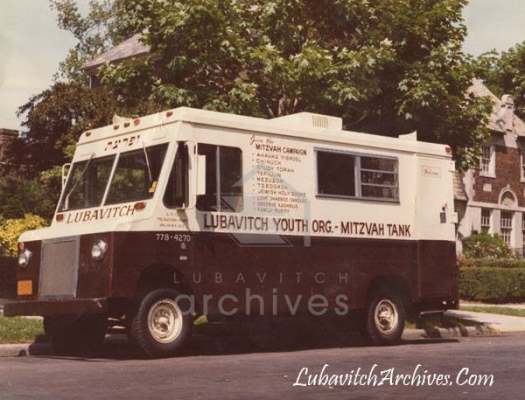
‘Tank’ Time Works for the Student and the Seasoned
Every Friday, 23-year-old Yonasan Waller hops aboard an oversized RV outfitted with colorful signs and loudspeakers. Dubbed a “mitzvah tank,” the vehicle—stocked with folding tables, Torah literature, tefillin and Shabbatcandles—serves as a mobile command center for Waller and a dozen of his fellow yeshivah students, who drive from Brooklyn to Manhattan every week. Their goal along the way is to spread Jewish awareness, and encourage Jewish men and women to perform mitzvahs.
Waller’s group multiplied this past Friday as they were joined by visiting rabbis from across the globe in town for the annual International Conference of Shluchim. Many of them had plied tefillin and Shabbat candles on those very same streets decades ago.
“Mitzvah tanks” first made their appearance in the mid-1970s as the Rebbe—Rabbi Menachem M. Schneerson, of righteous memory—guided his students in bringing Judaism to the people, to the everyday. The vehicles could reach Jews at work or out doing errands—Jews who otherwise might not have taken the initiative to connect to their heritage.
The vehicles got their names, the Rebbe explained, because they served to battle Jewish apathy, ignorance and assimilation.
Fast-forward 40 years. “Mitzvah tanks” have become an integral part of life in Manhattan, as well as in Montreal, Miami, Chicago and many other major North American cities. Many of the original “tankists,” as they were (and are still) called, now serve as permanent Chabad emissaries in communities around the world.
On Fridays, the one day of the week whenyeshivahs relax their rigorous schedules of Torah study, young Chabadniks heed the Rebbe’s call to bring Judaism to the Jews. Most have weekly routes, where they meet business people and dispense tefillin-wraps, Shabbat candles and Torah publications, including Chabad.org’s Think Jewish. Others travel via “mitzvah tank” to central urban locations, where they ply their spiritual wares to passersby.
More Than Nostalgia
Those shluchim who managed to carve out a few hours on Nov. 1 to join the students on their routes got the chance to relive their own youthful experiences.
And sometimes, the results wind up being about more than just nostalgia.
Rabbi Binyomin Scheiman—a Brooklyn native who has served as a Chabad emissary to Illinois since 1980—says his “tank” interactions have had very tangible results back home.
“When I first began riding with the yeshivahstudents three years ago [at conference time], there was a tourist couple who came aboard. We started talking, and they said they had a son in Illinois who needed some help,” relates Scheiman, whose primary focus is assisting Jews behind bars and Jews who have recently left the penal system, in addition to their families. “Of course, I took down their contact information. I called their son and tried to do what I could for him.
“The parents and I formed a friendship. We talk on the phone every week to wish each other a good Shabbat. Our connection means a lot to me—and I know it is special for them as well.”
Scheiman says the initiative of including former “tankists” is dedicated in memory of Rabbi Dovid Raskin, chairman of Lubavitch Youth Organization, the umbrella organization of the Mitzvah Tank Office.
For his part, Waller says he and his friends relish having the more seasoned rabbis aboard.
“Knowing that they dedicate their entire lives—not just a few hours on Friday—to the Rebbe’s work makes this very special for us,” emphasizes Waller, a London native who studies at the Central Lubavitcher Yeshivah at Lubavitch World Headquarters in Brooklyn. “Our inspiration is on a whole different level.”















mnemes
yonason great job you rock
a reader
Nice seeing the Tank built by Mendel Raksin, it brings back old memories.